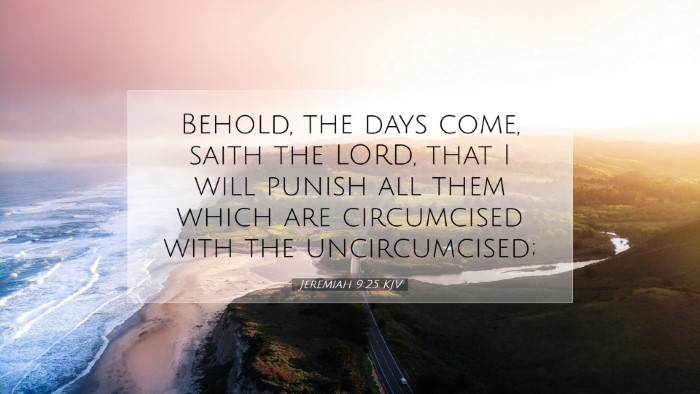Commentary on Jeremiah 9:25
Verse: "Behold, the days come, saith the Lord, that I will punish all them which are circumcised with the uncircumcised."
This verse presents a profound declaration from God about impending judgment, encompassing both the people of Israel and their neighbors. It speaks to the theme of divine justice, the relationship between God's covenant people and their moral obligations, and the broader implications of sin across nations.
Contextual Background
Jeremiah was a prophet called to deliver messages from God during a time of moral decline in Judah. His prophetic ministry emphasized the necessity of repentance, warning the people about the consequences of turning away from God. Chapter 9 outlines God's lamentation over His people, highlighting their sinfulness and lack of understanding.
Theological Insights
1. Judgement for All: The phrase "...circumcised with the uncircumcised..." suggests that God's judgment does not discriminate based on outward signs of covenant. Matthew Henry explains that this serves as a warning that mere religious observance, such as circumcision, does not equate to true faith or righteousness. God desires genuine obedience over ritual.
2. The Meaning of Circumcision: Circumcision, as a sign of the covenant between God and Israel, holds great significance. Albert Barnes notes that the Israelites prided themselves on being God's chosen people, marked by this symbol. However, it now functioned as a stark contrast to their moral failures. God promises to hold even His covenant people accountable for their actions, indicating that physical markers of faith are insufficient without corresponding righteousness.
3. Implications for the Nations: The judgment mentioned extends beyond Israel, encompassing the uncircumcised nations. Adam Clarke emphasizes that God’s sovereignty and justice are universal. This acknowledgment resonates with the New Testament themes of integrating Gentiles into the faith community, exemplifying the overarching principle of grace that transcends ethnic boundaries.
Literary Structure
Jeremiah 9 is rich in poetic imagery and calls for attention. The juxtaposition of circumcision and uncircumcision serves as a rhetorical device, conveying the severity of God's impending judgment. The language employed is both direct and evocative, inviting the reader to contemplate the realities of divine justice.
Application for Believers
This scripture invites reflection on several applied theology points for contemporary believers:
- Authenticity in Faith: Just as the Israelites were cautioned, believers today must examine their hearts. External religion must align with internal faith.
- The Necessity of Repentance: God calls His people to turn from sin. Regular self-examination and repentance are essential in maintaining a faithful walk with Him.
- Universal Accountability: The text reinforces the understanding that all humanity is subject to God's judgment, emphasizing the urgency for evangelism and spreading the Gospel beyond cultural boundaries.
Conclusion
Jeremiah 9:25 invites its readers to grasp the seriousness of becoming complacent in faith. The insights derived from public domain commentaries highlight that God’s character encompasses both mercy and justice. It is a call to remember that true relationship with God is manifest in our lives, not in mere tradition. As the church continues to reflect on the depth and breadth of God's covenant, may this verse serve as a perpetual reminder of our need for authenticity, humility, and grace in our walk with Him.


